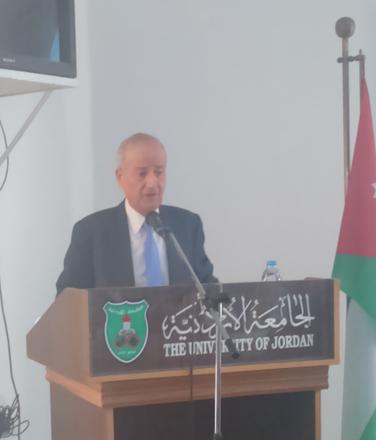You are here
‘Quality assurance criteria for pharmacology launched to improve university output’
By Laila Azzeh - Aug 10,2015 - Last updated at Aug 10,2015
AMMAN — The Higher Education Accreditation Commission (HEAC) on Monday launched the quality assurance criteria for pharmacology programmes in Jordanian universities.
With the main aim of taking pharmacology in the Kingdom to the next level, the commission has prepared a manual of quality assurance standards that can assist faculties in assessing performance when they apply for HEAC accreditation for their programmes.
“The manual will help faculties of pharmacology conduct self-assessment studies, which are a very important component to attain the quality assurance certificate,” said Khaled Al Fawares, deputy president of the HEAC for quality assurance affairs.
At a workshop to launch and discuss the standards, he noted that pharmacology programmes that do not obtain the certificate cannot be included in the ranking.
“The ranking will identify which university offers the strongest programmes in a given specialisation,” Fawares added, noting that universities that apply for accreditation should at least have graduated two batches of students in order to judge their output.
“After we accept the application, we ask the university to conduct a self-assessment study based on the criteria offered today,” he said.
Following this step, a committee of experts will examine the study and pay field visits before granting the certificate, explained Fawares.
With around 1,500 to 2,000 pharmacology students graduating every year, more than 80 per cent of whom are women, the demand on the specialisation is still high, especially since there is no unemployment in the sector, according to the HEAC.
“The problem is that the vast majority of women pharmacists withdraw from the labour market after marriage,” said Fawares.
His observation was echoed by deans of pharmacology faculties attending the workshop.
Quality assurance criteria include eight standards that touch on strategic planning, governance, academic programmes, scientific research and innovation, students’ services, community service and external relations, in addition to financial and human resources.
Higher education institutions are also required to have offices inside the faculties to communicate with students after graduation and track their desirability in the labour market.
“This will improve competitiveness among universities and help them stand out according to their output,” Fawares noted, adding that faculty members will have to publish at least two research papers a year in international magazines under the criteria.
The deans expressed their enthusiasm over the certificate, but voiced concerns over the ranking process, mechanisms of the panel of experts’ work and the time given before they can apply to obtain it.
HEAC said that the process will take a “long enough time” to ensure universities’ preparedness and that the committee will include international experts in the field.
The Jordan Pharmacists Association was not present at the meeting due to internal issues.
“We will make sure to invite all stakeholders to the upcoming workshops, but the pharmacists association could not be present today as there is no current council at the syndicate,” Fawares told The Jordan Times.
HEAC has also finalised quality assurance criteria for the specialties of educational sciences, administration, information technology, engineering, nursing, tourism and hospitality, medicine and dentistry, the Jordan News Agency, Petra, reported.
Related Articles
AMMAN — The vast majority of university students suffer from “poor” scientific research, analytical, critical and numerical skills, accordin
AMMAN — Higher Education Accreditation Commission (HEAC) President Bashir Zu’bi on Thursday said that results of classification of the Jorda
AMMAN — The Queen Rania Teacher Academy (QRTA) received international academic accreditation for its Teacher Education Professional Diploma

















